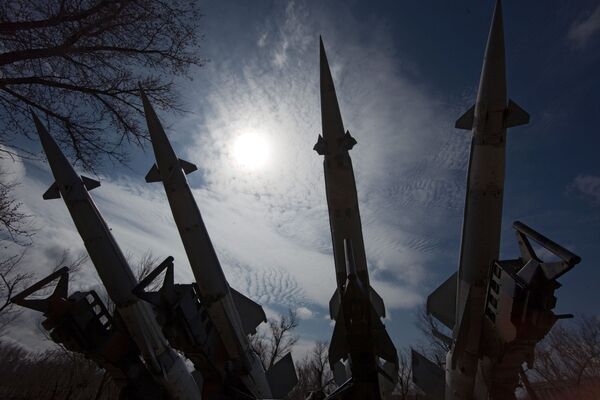The big question facing the Munich Security Conference this year is: Will the new and unexpected security threats emerging from the Middle East interfere with the serious dialogue between Russia and NATO on general missile defense, or will they help?
Much like the World Economic Forum in Davos, no vital security decisions are made in Munich. Rather, it offers participants a chance to share ideas in an informal setting. These ideas are then gradually translated into government policy.
The Middle East looms large
Like Davos, this former NATO conference (attended this year by about fifty heads of state and ministers) has global pretentions, though it is primarily concerned with the Euro-Atlantic region. The fact is that the biggest threats to the security of this region often emanate from elsewhere.
At this year's conference, which runs from February 4 to 6, the uprisings in Egypt, Tunisia, and the developments in the Middle East in general will surely take center stage. Delegates will have to improvise to some degree, as the events are still unfolding. It will be particularly interesting to hear the opinions of U.S. Secretary of State Hillary Clinton, National Security Advisor Thomas E. Donilon and other members of the Obama administration, who have already arrived in Munich.
The U.S. delegates will no doubt want to know how their European allies plan to help them address emerging threats in the region, which could prove far more serious than Iraq or Afghanistan.
A guerilla with a computer
Cyber security is sure to be another hot-button issue. British Foreign Secretary William Hague will deliver his a speech late on Friday evening in which he will discuss the need for an "international code of conduct" for the Internet. He will also propose a conference on this issue, to be held in London.
The main threat to cyber security today, at least for Western nations, is Wikileaks founder Julian Assange and his ilk.
Obama harnessed the power of the Internet in his campaign for president, which is a good thing. But now freedom of the web has shown what it is truly capable of in Tunisia and Egypt, where the nightmare of the 2000s could very well become a reality - a total war of Muslim extremists against all things Western. These mass demonstrations were fuelled by Internet activists in the tradition of Assange. They are poorly educated "freedom fighters" suffering from a herd mentality, an inferiority complex, and a hatred of ruling elites and all those successful and well off. The guerilla with a machine gun is a familiar sight. Is the multimedia guerilla with a laptop any better? The Internet and social media are double-edged swords. Therein lies the problem.
Friends to an extent
The Munich Security Conference should also be a place for meaningful and open dialogue between Russian and NATO delegates on missile defense. Moscow has made it clear that if there is no progress on missile defense, particularly in Europe, after the ratification of the New START Treaty, Russia will have to take measures to ensure its security.
NATO wants to talk about joint missile defense with Russia and, in general, to get along. But if NATO uses the talks as a cover to create a missile defense system that is, in fact, aimed against Russia, all the recent progress made by Russia and the West will go to waste.
The reset began long before Dmitry Medvedev and Barack Obama. Ronald Reagan called Mikhail Gorbachev a friend. George W. Bush looked into Vladimir Putin's soul, and a declaration followed affirming that Russia and the United States were no longer enemies. Two documents on the principles of Russia-NATO cooperation were signed in 1997 and 2002.
But NATO's campaign in Yugoslavia in 1999 and the conflict in the Caucasus in 2008 showed that these documents were about as valuable as the paper they were printed on. Any seasoned bureaucrat can tell you that all the day-to-day documents still define the two sides - either tacitly or implicitly - as enemies. Declarations are just there to pacify the naive.
The path forward
This time Moscow along with some rather powerful forces in the United States and Europe sincerely want to make progress. President Dmitry Medvedev attended the Lisbon summit in November last year. In the resulting declaration, the sides said that they want to see a true strategic partnership between NATO and Russia. Moscow was invited to participate in a joint missile defense system.
And a special meeting with Mevdedev in Moscow was arranged last October in the run-up to this year's Munich conference. The visit was led by Wolfgang Friedrich Ischinger, the main organizer of Munich conferences. Everyone agreed that no more declarations are needed.
It is important to do something real to break down the wall of mistrust. The cascade of expert meetings in Munich will reveal whether the sides are up to the challenge.
We cannot afford to drag this process out for purely technical reasons. During the year we will have to decide a big question: whether to build two missile defense systems or one common one.
This year, Foreign Minister Sergei Lavrov rather than President Medvedev will go to Munich. He expressed his position on an array of issues at a news conference in January.
It is unclear what affect the new security challenges arising in the Middle East will have on the missile defense debate. Perhaps it will make all the NATO delegates realize that Russia is not the enemy, and they will drop missile defense to focus on more pressing matters. Or perhaps these emerging threats will elevate Russia's importance, and a joint missile defense system will seem like an excellent idea.
The views expressed in this article are the author's and may not necessarily represent those of RIA Novosti.



